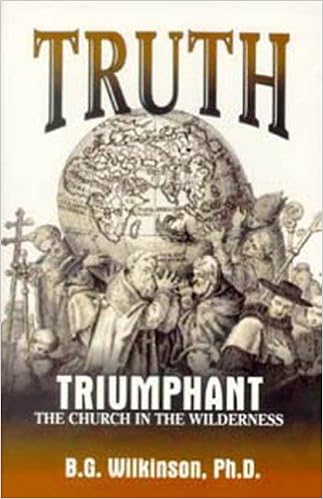Wilkinson grounds his argument in Biblical prophecy, seeing the "1260 days" of Daniel and Revelation as being symbolic of 1260 years in which the church would be in the wilderness, which he dates from around 538, when Justinian unified church and state, to the Reformation and, more precisely, Napoleon's eventual takeover of the Italian peninsula and the religious freedom that that brought to the peoples of Europe in 1798. The prophetic elements make up the first and last chapters of the twenty-four chapters in the book, which means that they don't take up that much space, which is good, since one could likely argue quite a few things with regard to what the 1260 days of the Bible refer to. My interest was more in the history.
What I really enjoyed about the book is that Wilkinson pulls in a lot of sources with which I was not otherwise terribly familiar. Most studies I've read about church history focus on the West, and generally they follow a pretty straight line through Rome, ignoring many of the "heretical" sects that continued to exist long after Christianity was institutionalized within the realm of the Papacy. Beyond that is the Church of the East, which had a much different history, much of which has either not been studied as extensively (since the languages of such people are non-Western) or has been expunged in the course of time with the spread of Papal teachings further to the East.
But there disadvantages to Wilkinson's study as well. Much of his case with regard to the history of the Church of the East is based on the idea that the Christians in the East, though not necessarily Nestorians (a particular heretical sect), were generally called such, no matter their actual beliefs. While this is probably the case, given that often our understandings of the doctrines of particular peoples are not terribly complete and given that doctrines change over time such that a certain type of Christian in once century is not nearly the same type centuries later, even though they might share a secterian name. But there is also a level on which one has to be careful in making such claims, and often, it seemed to me that Wilkinson made claims that were a bit more than what other scholarship and what the primary sources actually attest to. Lucian of Antioch, for example, plays a large role in Wilkinson's work, and of course, Lucian was important. His own Bible translation was based on a different kind of translation theory and was into a language other than Greek, and it would form the foundation for much of the work of the Church of the East. But what Lucian actually believed is, so far as what I have read elsewhere, largely conjecture. He didn't leave other writings behind. In Wilkinson's work, Lucian becomes a non-allegorist, as opposed to the kind of scriptural readings occurring in Alexandria and Rome. That is one interpretation offered by scholars; here, that is the only one offered, which means one gets a sort of twisted picture of Lucian and whoever Wilkinson connects to him, which in turn draws into question the accuracy of his others observations (many of which, in the footnotes, are backed up merely by cross-references to chapters within his own book rather than outside sources).
But that qualm I have is balanced against the many sources that Wilkinson has drawn on and his focus on areas less written about. It's a fantastic foundation for further study. The work can be found online here.







No comments:
Post a Comment